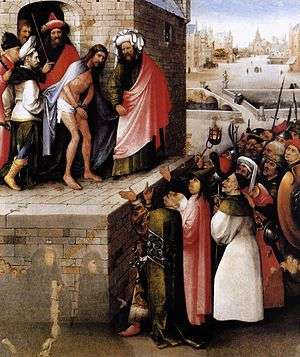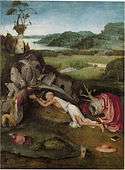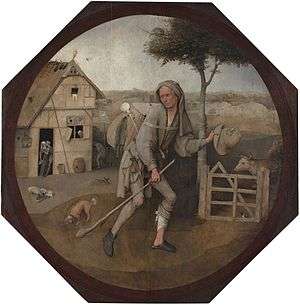List of paintings by Hieronymus Bosch
.jpg)
Bosch's signature from the triptych Adoration of the Magi. Only a few of the surviving paintings by the master are signed.
This article lists paintings by Hieronymus Bosch, as well as paintings attributed to him or his school. For Bosch's drawings, see Hieronymus Bosch drawings. Since the precise chronology of Bosch's works is currently impossible to establish, paintings within sections are sorted alphabetically. The recent very thorough investigation by The Bosch Research and Conservation Project of a multitude of Bosch's paintings included dendrochronological research and made an approximate dating of the paintings possible. The findings of this investigation were published in a book in 2016.[1] All dates given below are taken from this reference. The book describes the other findings of the investigation as well, such as painting technique, layer structure and pigment analyses. Illustrated pigment analyses of Bosch's paintings can also be found at ColourLex.[2]
Bosch's works are generally organized into three periods of his life dealing with the early works (c. 1470–1485), the middle period (c.1485–1500), and the late period (c. 1500 until his death). According to Stefan Fischer, thirteen of Bosch's surviving paintings were completed in the late period, with seven surviving paintings attributed to his middle period.[3] Bosch's early period is studied in terms of his workshop activity and possibly some of his drawings. There are no surviving painting attributed to before 1485.
Examples of Bosch's work can be found in Austria, Belgium, France, Germany, Italy, Netherlands, Portugal, Serbia, Spain, the UK, and the US.
Triptychs
| Image |
Details |
 |
- Adoration of the Magi
- ca 1491 - 98
- Oil on wood
- 138 × 144 cm
- Museo del Prado, Madrid, Spain
-
- The outer panels form a single image, Saint Gregory's Mass, rendered in grisaille.
|
 |
- The Garden of Earthly Delights
- ca 1495-1505
- Oil on wood
- 220 × 389 cm
- Museo del Prado, Madrid, Spain
-
- The outer panels form a single image, The Creation of the World, rendered in grisaille.
|
.jpg) |
- The Haywain
- 1510-16
- Oil on wood
- 147 × 232 cm (Escorial version)
- 135 x 190 cm (Prado version)
- El Escorial, Spain (version 1)
- Museo del Prado, Madrid, Spain (version 2)
-
- Two versions of this triptych exist, one in El Escorial, the other in Museo del Prado. Both are most probably copies of a lost Bosch original. The outer panels form a single image, usually referred to as The Path of Life.
|
 |
- Passion Triptych
- c. 1530
- Commissioned by Mencía de Mendoza (1508-1554) for her burial chapel (the Chapel of the Epiphany) in the convent of Santo Domingo, Valencia
- Oil on panel
- 163 × 382 cm
- Museu de Belles Arts de València, Valencia, Spain
-
- Probably not a work by Bosch, but by a Flemish follower.
-
|
 |
- Hermit Saints Triptych
- ca 1495-1505
- Oil on wood
- 86 × 100 cm
- Palazzo Ducale, Venice, Italy
|
 |
- The Last Judgment
- ca 1500-05
- Oil on wood
- 163.7 × 127 cm (central panel)
- 167.7 × 60 cm (left wing)
- 167 × 60 cm (right wing)
- Academie für Bildenden Künste, Vienna, Austria
-
- The outer panels show two images: Saint James the Greater and Saint Bavo, both rendered in grisaille.
|
 |
- The Last Judgment
- ca 1495-1505
- Oil on wood
- 99.5 × 117.5 cm
- Groeningemuseum, Bruges, Belgium
-
- Attributed to Bosch and/or his workshop. The outer panels form a single image, Christ Crowned with Thorns.
|
 |
- The Martyrdom of St. Julia
- ca 1495-1505
- Oil on wood
- 104 × 119 cm
- Palazzo Ducale, Venice, Italy
|
 |
- The Temptation of St. Anthony
- ca 1500-10
- Oil on wood
- 131.5 × 225 cm
- Museu Nacional de Arte Antiga, Lisbon, Portugal
-
- The outer panels show two images: The Arrest of Christ and Christ Bearing the Cross, both rendered in grisaille.
|
|
Diptychs and polyptychs
| Image |
Details |
    |
- Diptych (Hell and the Flood)
- The Fall of the Rebel Angels {Front {top} and back {bottom}
- Noah's Ark on Mount Ararat
- Mankind Beset by Devils (on the reverse sides)
- Oil on wood
- 69.5 × 35 cm (each panel)
- 34.5 cm (diameter of paintings on the reverse sides)
- Museum Boijmans Van Beuningen, Rotterdam, Netherlands
|
 |
- Polyptych (Visions of the Hereafter)
- 1505-15
- Oil on wood
- 86.5 × 39.5 (each)
- Palazzo Grimani, Venice, Italy
-
- Also known as Cardinal Grimani's Altarpiece. Probably part of a larger (four more paintings) altarpiece, now lost.
|
|
Single panels and fragments of lost altarpieces
The life of Christ
| Image |
Details |
 |
- Adoration of the Child
- Oil on wood
- 66 × 43 cm
- Wallraf-Richartz Museum, Cologne, Germany
-
- Bosch's authorship is disputed; possibly a copy after a lost Bosch original. Another, wider version of the same painting is kept in Noordbrabants Museum, 's-Hertogenbosch (on loan from the Rijksmuseum, Amsterdam), and yet another is in Musées royaux des Beaux-Arts de Belgique in Brussels.
|
.jpg) |
- Adoration of the Magi
- ca 1470-80
- Oil on wood
- 71.1 × 56.5 cm
- Metropolitan Museum of Art, New York, USA
-
- Described by Friedländer as ‘an especially early work by the master’; later deemed a 16th-century pastiche; more recently thought to be a work dating back to the 1470s from Bosch's immediate circle[4]
|
 |
- Adoration of the Magi
- Oil on wood
- 94 × 74 cm
- Museum of Art, Philadelphia, USA
|
 |
- Crucifixion With a Donor
- Oil on wood
- 74.7 × 61 cm
- Royal Museums of Fine Arts of Belgium, Brussels, Belgium
|
 |
- Christ Carrying the Cross (Vienna)
- ca 1490-1510
- Oil on wood
- 57 × 32 cm
- Kunsthistorisches Museum, Vienna, Austria
-
- The reverse side of the panel has another painting on it, Christ Child with a Walking Frame (diameter 28 cm).
|
 |
- Christ Carrying the Cross (Ghent)
- ca 1530-40
- Oil on wood
- 74 × 81 cm
- Museum voor Schone Kunsten, Ghent, Belgium
-
- Bosch's authorship is disputed.
|
 |
- Christ Carrying the Cross (Madrid)
- ca 1495-1505
- Oil on wood
- 150 × 94 cm
- Palacio Real, Madrid, Spain
|
_-_Google_Art_Project.jpg) |
- Christ Crowned with Thorns (London)
- ca 1490-1500
- Oil on wood
- 73 × 59 cm
- National Gallery, London, UK
|
 |
- Christ Crowned with Thorns (Escorial)
- ca 1530-40
- Oil on wood
- 165 × 195 cm
- El Escorial, Spain
Painted neither by Bosch nor his workshop. |
 |
- Ecce Homo (Philadelphia)
- Oil on wood
- 52 × 54 cm
- Museum of Art, Philadelphia, USA
-
- Previously attributed to Bosch; dendrochronological analysis proved it to be a late 16th-century work by a follower
|
 |
- Ecce Homo (Frankfurt)
- ca 1475-85
- Oil on wood
- 71 × 61 cm
- Städel Museum, Frankfurt, Germany
|
.jpg) |
- The Marriage Feast at Cana
- Oil on wood
- 93 × 72 cm
- Museum Boijmans Van Beuningen, Rotterdam, Netherlands
-
- Several versions of this painting exist. However, none of these date from Bosch’s lifetime.
|
|
Saints
| Image |
Details |
 |
- St. Jerome at Prayer
- ca 1485-95
- Oil on wood
- 77 × 59 cm
- Museum voor Schone Kunsten, Ghent, Belgium
|
 |
- St. Christopher Carrying the Christ Child
- ca 1490-1500
- Oil on wood
- 113 × 71.5 cm
- Museum Boijmans Van Beuningen, Rotterdam, Netherlands
|
 |
- St. John the Baptist in the Wilderness
- ca 1490-95
- Oil on wood
- 48.5 × 40 cm
- Museo Lázaro Galdiano, Madrid, Spain
|
 |
- St. John the Evangelist on Patmos
- ca 1490-95
- Oil on wood
- 63 × 43.3 cm
- Gemäldegalerie, Berlin, Germany
-
- The reverse side of the panel has a round double painting (diameter 39 cm) on it: Scenes from the Passion of Christ (outer circle) and The Pelican with Her Young (inner circle).
|
.jpg) |
- The Temptation of St. Anthony
- ca 1500-1510
- Oil on wood
- 38.6 x 25.1 cm
- Nelson-Atkins Museum of Art, Kansas City, MO
-
- There was a dispute as to whether this work was a Bosch autograph or a piece by the workshop until the Bosch Research and Conservation Project concluded it to be autograph based on evidence present in the underdrawing.[5]
|
.jpg) |
- The Temptation of St. Anthony
- ca 1530-40
- Oil on wood
- 70 × 51 cm
- Museo del Prado, Madrid, Spain
-
- Bosch's authorship is disputed.
|
|
Other works
| Image |
Details |
 |
- Allegory of Gluttony and Lust
- ca 1500-10
- Oil on wood
- 35.8 × 32 cm
- Yale University Art Gallery, New Haven, USA
-
- Fragment of a lost triptych which also included Ship of Fools (the Allegory would be the lower part of that outer wing) and Death and the Miser (the other outer wing).
|
 |
- The Conjurer
- ca 1530-40
- Oil on wood
- 53 × 65 cm
- Musée Municipal, Saint-Germain-en-Laye, France
-
- Bosch's authorship is disputed.
|
 |
- Death and the Miser
- ca 1500-10
- Oil on wood
- 92.6 × 30.8 cm
- National Gallery of Art, Washington, D.C., USA
-
- Outer wing of a lost triptych. The other outer wing comprised Ship of Fools (top) and Allegory of Gluttony and Lust (bottom).
|
 |
- Death of the Reprobate
- Oil on wood
- 34.6 × 21.2 cm
- Private collection, New York, USA
-
- Probably a copy of a fragment of a lost triptych.
|
.jpg) |
- Cutting the Stone
- ca 1500-20
- Oil on wood
- 48 × 35 cm
- Museo del Prado, Madrid, Spain
-
- Also known as The Cure of Folly.
|
 |
- Head of a Halberdier
- Oil on wood
- 28 × 20 cm
- Museo del Prado, Madrid, Spain
-
- Fragment of a Christ Crowned with Thorns by a follower of Bosch.
|
 |
- Head of a Woman
- Oil on wood
- 13 × 5 cm
- Museum Boijmans Van Beuningen, Rotterdam, Netherlands
-
- Fragment. Attribution uncertain.
|
 |
- The Last Judgment (fragment)
- ca 1530-40
- Oil on wood
- 60 × 114 cm
- Alte Pinakothek, Munich, Germany
-
- Fragment of a lost triptych. Bosch's authorship is disputed.
|
 |
- The Seven Deadly Sins and the Four Last Things
- ca 1510-20
- Oil on wood
- 120 × 150 cm
- Museo del Prado, Madrid, Spain
- Bosch's authorship is disputed.
|
 |
- Ship of Fools
- ca 1500-10
- Oil on wood
- 58 × 33 cm
- Louvre, Paris, France
-
- Fragment of a lost triptych which also included Allegory of Gluttony and Lust (which is the lower part of the Ship of Fools wing) and Death and the Miser (the other outer wing).
|
 |
- The Wayfarer
- ca 1500-10
- Oil on wood
- 71.5 cm (diameter)
- Museum Boijmans Van Beuningen, Rotterdam, Netherlands
-
- This is the outer panel of a lost triptych.
|
|
References
- ↑ Luuk Hoogstede, Ron Spronk, Robert G. Erdmann, Rik Klein Gotink, Matthijs Ilsink, Jos Koldeweij, Hanneke Nap, and Daan Veldhuizen, Hieronymus Bosch, Painter and Draughtsman – Technical Studies, Yale University Press, New Haven, 2016.
- ↑ ColourLex: Art and Science
- ↑ Stefan Fischer. Bosch: The Complete Works.
- ↑ See: Gallery Label Metropolitan Museum of Art Collection Database
- ↑ http://www.nelson-atkins.org/authentication-hieronymus-bosch-panel-nelson-atkins-called-significant/
Further reading
- Matthijs Ilsink, Jos Koldeweij, Ron Spronk, Luuk Hoogstede, Robert G. Erdmann, Rik Klein Gotink, Hanneke Nap, and Daan Veldhuizen. Hieronymus Bosch: Painter and Draughtsman – Catalogue raisonné, Yale University Press, New Haven and London, 2016.
- Luuk Hoogstede, Ron Spronk, Robert G. Erdmann, Rik Klein Gotink, Matthijs Ilsink, Jos Koldeweij, Hanneke Nap, and Daan Veldhuizen, Hieronymus Bosch, Painter and Draughtsman – Technical Studies, Yale University Press, New Haven, 2016.
External links
|
|---|
| Single panels | |
|---|
| Triptychs | |
|---|
| Triptych fragments | |
|---|
| Related | |
|---|
.jpg)


.jpg)











.jpg)





_-_Google_Art_Project.jpg)



.jpg)




.jpg)
.jpg)




.jpg)




